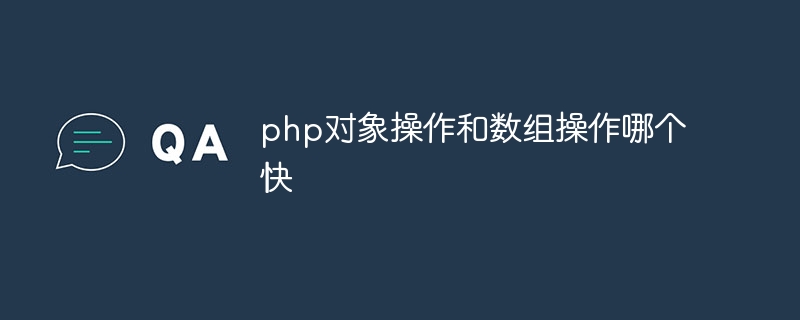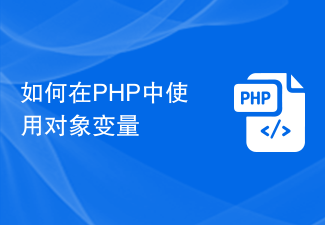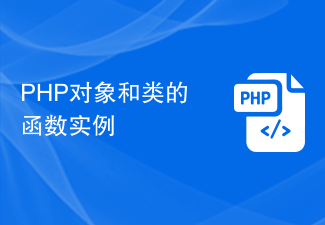PHP object to array refers to the process of converting a PHP object into an associative array. In PHP, an object is an instantiation of a class, with attributes and methods, and an array is a series of key-value pairs. composed data structure. By manual conversion, using the "get_object_vars()" function or using the type conversion operator, object to array conversion can be achieved, data can be easily processed and transferred, and the readability and maintainability of the code can be improved.

The operating system of this tutorial: Windows10 system, PHP version 8.1.3, DELL G3 computer.
PHP object to array conversion refers to the process of converting a PHP object into an associative array. In PHP, objects are instantiations of classes and they have properties and methods. An array is a data structure composed of a series of key-value pairs.
In actual development, we often need to convert objects into arrays to facilitate data processing and transfer. PHP provides several methods to achieve object to array conversion.
Manual conversion:
Manual conversion is the most basic method, which can be done by traversing the properties of the object and adding the key and value of each property to a new array. This requires writing some extra code to handle the different types of properties.
For example, suppose there is a Person class with two attributes: name and age. We can use the following code to convert a Person object into an array:
class Person {
public $name;
public $age;
}
$person = new Person();
$person->name = "John";
$person->age = 30;
$array = array();
$array['name'] = $person->name;
$array['age'] = $person->age;This method is more cumbersome and requires manual assignment of values for each attribute. When there are many attributes, it will increase the complexity and maintenance cost of the code.
Use the get_object_vars() function:
PHP provides a built-in function get_object_vars(), which can return an object’s attributes and an associative array of attribute values. This function returns the public and protected properties of the object, but not the private properties.
For example, we can use the get_object_vars() function to convert a Person object into an array:
class Person {
public $name;
public $age;
}
$person = new Person();
$person->name = "John";
$person->age = 30;
$array = get_object_vars($person);This method is more concise and does not require manually assigning values to each attribute. Directly convert the object's properties into array key-value pairs.
Using type conversion:
PHP also provides a simple way to convert an object to an array, that is, convert an object to an array through the type conversion operator. This method converts an object's public and protected properties into an array of key-value pairs.
For example, we can convert a Person object into an array through the following code:
class Person {
public $name;
public $age;
}
$person = new Person();
$person->name = "John";
$person->age = 30;
$array = (array) $person;This method is very simple, just use the type conversion operator to convert the object into an array. But it should be noted that private properties will not be converted into array key-value pairs.
To sum up, converting a PHP object to an array is the process of converting a PHP object into an associative array. We can convert objects to arrays by manual conversion, using the get_object_vars() function, or using type conversion operators. This makes it easy to process and transfer data, improving the readability and maintainability of the code.
The above is the detailed content of What is converting php object to array?. For more information, please follow other related articles on the PHP Chinese website!
 php数组如何循环转为对象Aug 10, 2023 pm 02:44 PM
php数组如何循环转为对象Aug 10, 2023 pm 02:44 PMphp数组循环转为对象的方法有两个:1、使用强制类型转换可以将数组转换为对象,要求数组的键必须是有效的对象属性名;2、创建一个新的对象,并将数组的元素复制到该对象中,不依赖于数组键是否有效作为对象的属性名。
 php对象操作和数组操作哪个快Jul 12, 2023 pm 03:04 PM
php对象操作和数组操作哪个快Jul 12, 2023 pm 03:04 PMphp数组操作比php对象操作更快,其原因有:1、对象操作涉及创建对象、调用方法和访问属性等步骤,在性能上可能会比较慢;2、数组操作是一种特殊类型的变量,可以容纳多个值,对数组使用不同的方法和函数,可以对数组进行快速和有效的操作。
 php对象和数组区别是什么Aug 24, 2023 pm 05:02 PM
php对象和数组区别是什么Aug 24, 2023 pm 05:02 PMphp对象和数组区别是:1、对象是一个复合数据类型,而数组是一个简单的数据类型;2、对象的属性和方法可以通过对象的实例来访问,而数组的元素可以通过索引来访问;3、对象是一个封装了属性和方法的实体,而数组是一个有序的元素集合;4、对象在PHP中是通过引用来传递的,而数组在PHP中是通过值来传递的;5、对象适用于描述具有状态和行为的实体,而数组适用于存储和处理大量的相似数据。
 如何在PHP中使用对象变量Sep 13, 2023 pm 12:59 PM
如何在PHP中使用对象变量Sep 13, 2023 pm 12:59 PM如何在PHP中使用对象变量,需要具体代码示例在PHP中,使用对象变量可以更方便地管理和操作对象。对象变量是存储对象实例的一种数据类型,可以通过调用类的方法和访问类的属性来操作对象。下面将具体介绍在PHP中如何使用对象变量,并提供相应的代码示例。创建对象在PHP中,可以使用new关键字来创建对象。示例如下:classCar{public$colo
 php数组是对象吗Jul 22, 2022 pm 05:24 PM
php数组是对象吗Jul 22, 2022 pm 05:24 PMphp数组不是对象。在php中,数组和对象是两种不同的数据类型,数组是一组有序数据的集合;而对象是类进行实例化后的结果,里面不仅有属性,还有方法。对象可以封装对数据的操作,而数组是办不到的。
 探讨如何在PHP中调用对象方法Mar 28, 2023 pm 03:00 PM
探讨如何在PHP中调用对象方法Mar 28, 2023 pm 03:00 PMPHP是一种非常流行的编程语言,可以用于开发各种应用程序,尤其是Web应用程序。在PHP中,面向对象编程是其重要特性之一。本文将探讨如何在PHP中调用对象方法。
 php怎么获取一个对象中所有的方法Mar 23, 2023 am 11:12 AM
php怎么获取一个对象中所有的方法Mar 23, 2023 am 11:12 AM在PHP中,获取一个对象中所有的方法非常简单,可以利用PHP标准库中的 ReflectionClass 类实现。ReflectionClass 类提供了在PHP中反射一个类的所有信息的方法,包括类名、属性和方法等。下面我们详细介绍如何使用 ReflectionClass 类来获取一个对象中所有的方法。
 PHP对象和类的函数实例Jun 16, 2023 am 09:51 AM
PHP对象和类的函数实例Jun 16, 2023 am 09:51 AMPHP是一种面向对象的编程语言,支持对象和类的概念。在PHP中,对象是类的实例,它可以存储数据和函数,这些函数被称为方法。通过使用PHP对象和类的函数,我们可以轻松地组织代码并提高代码的可复用性。在本文中,我们将介绍关于PHP对象和类的函数的实例以及它们的功能。构造函数(__construct)构造函数是在创建对象时自动调用的函数。它用于初始化对象的属性和执


Hot AI Tools

Undresser.AI Undress
AI-powered app for creating realistic nude photos

AI Clothes Remover
Online AI tool for removing clothes from photos.

Undress AI Tool
Undress images for free

Clothoff.io
AI clothes remover

AI Hentai Generator
Generate AI Hentai for free.

Hot Article

Hot Tools

PhpStorm Mac version
The latest (2018.2.1) professional PHP integrated development tool

DVWA
Damn Vulnerable Web App (DVWA) is a PHP/MySQL web application that is very vulnerable. Its main goals are to be an aid for security professionals to test their skills and tools in a legal environment, to help web developers better understand the process of securing web applications, and to help teachers/students teach/learn in a classroom environment Web application security. The goal of DVWA is to practice some of the most common web vulnerabilities through a simple and straightforward interface, with varying degrees of difficulty. Please note that this software

SecLists
SecLists is the ultimate security tester's companion. It is a collection of various types of lists that are frequently used during security assessments, all in one place. SecLists helps make security testing more efficient and productive by conveniently providing all the lists a security tester might need. List types include usernames, passwords, URLs, fuzzing payloads, sensitive data patterns, web shells, and more. The tester can simply pull this repository onto a new test machine and he will have access to every type of list he needs.

Safe Exam Browser
Safe Exam Browser is a secure browser environment for taking online exams securely. This software turns any computer into a secure workstation. It controls access to any utility and prevents students from using unauthorized resources.

MinGW - Minimalist GNU for Windows
This project is in the process of being migrated to osdn.net/projects/mingw, you can continue to follow us there. MinGW: A native Windows port of the GNU Compiler Collection (GCC), freely distributable import libraries and header files for building native Windows applications; includes extensions to the MSVC runtime to support C99 functionality. All MinGW software can run on 64-bit Windows platforms.






